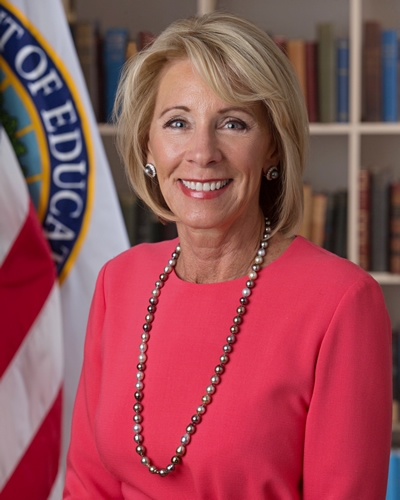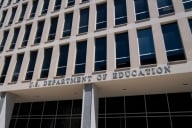You have /5 articles left.
Sign up for a free account or log in.

Education Secretary Betsy DeVos
U.S. Department of Education
A mixed ruling by a federal judge in Washington State dealt a limited blow to U.S. Education Secretary Betsy DeVos’s contention that only those college students eligible for regular student aid are able to get emergency grants Congress created in the CARES Act.
U.S. District Court Judge Thomas O. Rice granted a preliminary injunction that, for now, gives Washington State colleges and universities broader latitude in handing out the grants Congress created to help students whose lives were disrupted by campus closures during the coronavirus pandemic. Institutions in the state were apportioned $113 million of the $12 billion in emergency grants in the stimulus relief package to help students pay for pay for necessities like food and housing. The ruling, for now, allows institutions in the state to give the help to thousands more students, including veterans going to school on the GI Bill, those with poor grades, those who have defaulted on student loans and others who have not been able to get the grants because they are not eligible for regular student aid.
However, the injunction in the U.S. District Court for the Eastern District of Washington is limited in its scope. It applies only to institutions in Washington State and does not keep the interim rule DeVos announced last Thursday limiting the eligibility for the grants from going into effect in the rest of the nation as soon as today.
And in at least a temporary victory for DeVos, Rice stopped short of undoing the Education Department’s prohibition on undocumented students from getting the help, saying it’s unclear how the court will rule on that issue when it takes up the broader question of whether to permanently bar the department’s eligibility limits in the state.
However, the Washington State ruling could portend a similar ruling by a federal judge in Northern California, who is expected to rule shortly in a lawsuit filed by California’s community colleges that also challenges the Education Department’s limiting of which students in that state can get the grants.
An Education Department spokeswoman on Sunday pointed out that the ruling leaves in place the ban on undocumented students receiving the help.
In the ruling, Rice sided with DeVos’s critics on a key issue in the debate -- what Congress intended.
Attorneys for Washington State, reflecting the views of critics of colleges and universities and congressional Democrats, argued that nothing in the CARES Act says the grants should only go to those who are eligible for other kinds of student aid.
Justice Department attorneys representing the Education Department, however, pointed out that Congress, in other parts of the coronavirus relief package, mentions the Higher Education Act, the nation's main higher education law, which guides, among other things, federal student aid. The department argued that meant Congress intended for the grants to only go to students eligible for student aid.
But Rice said the fact Congress mentioned the HEA in other parts of the CARES Act, but chose not to mention it in creating the grants, meant lawmakers consciously decided to not apply the same rules to the grants as other federal student aid.
Rice was required to consider in deciding on the injunction how the court will rule when it takes up the broader question of whether to permanently bar the limits the department wants to put in place. And he said the department is not likely to win the argument over what Congress intended.
“There is no ambiguity for which the [Education Department] can interpret the CARES Act to be limited only to those individuals eligible for Title IV assistance under the HEA,” Rice wrote in the ruling.
But Rice wrote that “both sides present reasonable and compelling arguments” in the debate over whether undocumented students are eligible for the grants.
The state attorney general said nothing in the CARES Act says undocumented students are eligible, while the Education Department countered that nothing in the aid package mentions exempting undocumented students from existing laws barring those who are not citizens from getting federal benefits.
While not ruling one way or the other on the issue, Rice said he couldn’t say the court is likely to rule in favor of allowing undocumented students to receive the grants and didn't include undocumented students in the injunction.
Rice pointed to what’s at stake in the debate over the Higher Education Emergency Relief Fund: “The disruption of campus operations due to COVID-19 has caused students at Washington colleges and universities to incur unexpected expenses such as food, housing, course materials, technology, health care, and childcare,” he wrote.
“The harm to students that stems from the eligibility restriction is not only the inability to access HEERF funds; the harm is in the inability to access these emergency funds in a timely manner.”








